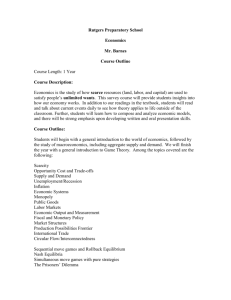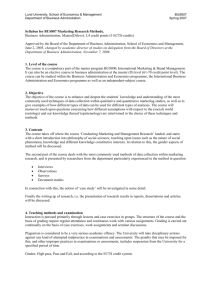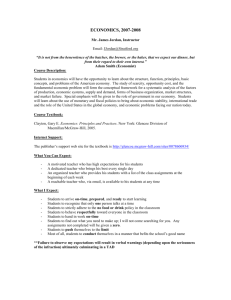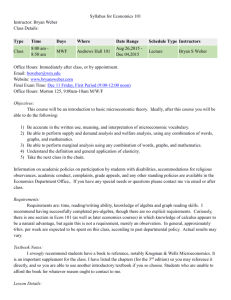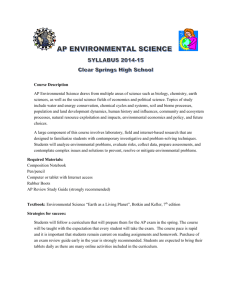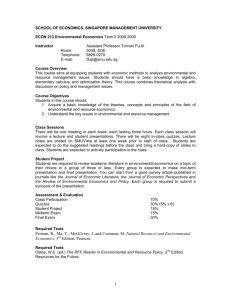here
advertisement
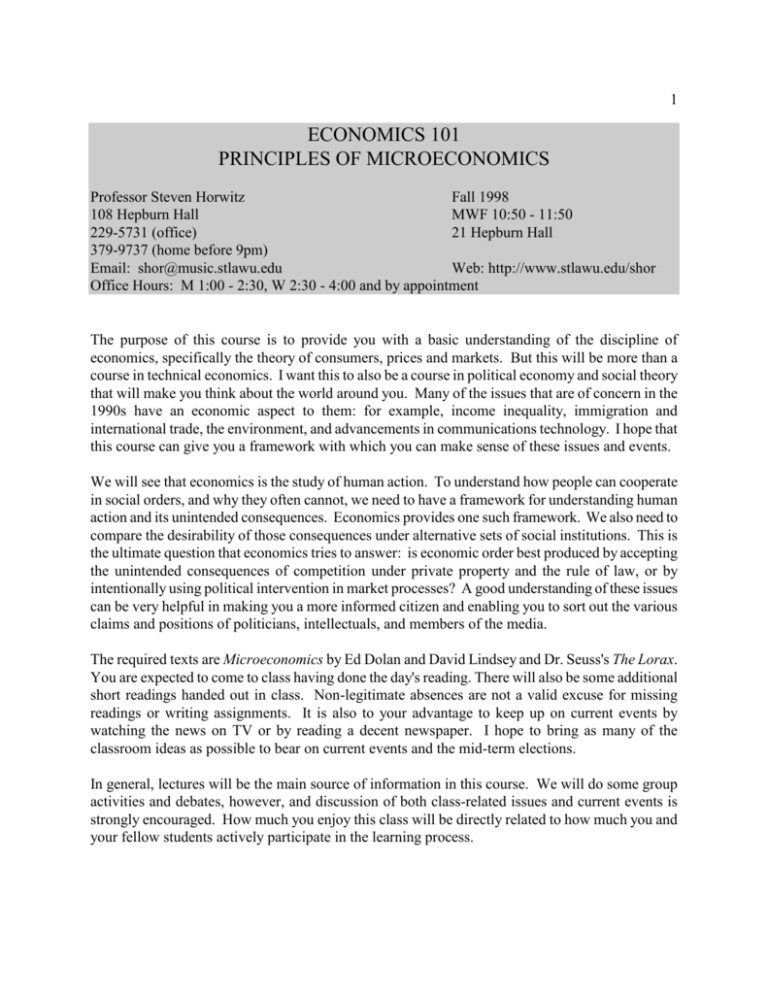
1 ECONOMICS 101 PRINCIPLES OF MICROECONOMICS Professor Steven Horwitz Fall 1998 108 Hepburn Hall MWF 10:50 - 11:50 229-5731 (office) 21 Hepburn Hall 379-9737 (home before 9pm) Email: shor@music.stlawu.edu Web: http://www.stlawu.edu/shor Office Hours: M 1:00 - 2:30, W 2:30 - 4:00 and by appointment The purpose of this course is to provide you with a basic understanding of the discipline of economics, specifically the theory of consumers, prices and markets. But this will be more than a course in technical economics. I want this to also be a course in political economy and social theory that will make you think about the world around you. Many of the issues that are of concern in the 1990s have an economic aspect to them: for example, income inequality, immigration and international trade, the environment, and advancements in communications technology. I hope that this course can give you a framework with which you can make sense of these issues and events. We will see that economics is the study of human action. To understand how people can cooperate in social orders, and why they often cannot, we need to have a framework for understanding human action and its unintended consequences. Economics provides one such framework. We also need to compare the desirability of those consequences under alternative sets of social institutions. This is the ultimate question that economics tries to answer: is economic order best produced by accepting the unintended consequences of competition under private property and the rule of law, or by intentionally using political intervention in market processes? A good understanding of these issues can be very helpful in making you a more informed citizen and enabling you to sort out the various claims and positions of politicians, intellectuals, and members of the media. The required texts are Microeconomics by Ed Dolan and David Lindsey and Dr. Seuss's The Lorax. You are expected to come to class having done the day's reading. There will also be some additional short readings handed out in class. Non-legitimate absences are not a valid excuse for missing readings or writing assignments. It is also to your advantage to keep up on current events by watching the news on TV or by reading a decent newspaper. I hope to bring as many of the classroom ideas as possible to bear on current events and the mid-term elections. In general, lectures will be the main source of information in this course. We will do some group activities and debates, however, and discussion of both class-related issues and current events is strongly encouraged. How much you enjoy this class will be directly related to how much you and your fellow students actively participate in the learning process. 2 GRADES AND ASSIGNMENTS Your grade will be based on two hour exams, two short writing assignments, two quizzes, and a comprehensive final. My exams are short-answer and essay, with a couple of graphs or mathematical problems along the way. BE WARNED - my exams are not mere regurgitation, they will make you THINK. Memorization will not get you a 4.0 in here. The final exam is cumulative although it will focus on the last part of the course. I will put a copy of an old exam on reserve before the first exam. The short writing assignments are as follows: The first analysis paper will be on the issue of income inequality. There’s much talk in the media about this subject and we will take a closer look at it and you will be asked to provide some opinion and analysis. The second paper is an economic analysis of Dr. Seuss's The Lorax. After spending a few days discussing environmental economics, you will be asked to read that book and analyze it from an economic perspective. These papers will be short, about 2-3 pages, and I will provide more information on them as they approach. Being absent is not an excuse for missing these assignments. You will also have two short quizzes, one in each of the first two sections. Class participation and attendance make up the final portion of your grade. All of the course materials, including this syllabus, will be available on the course home page, which is on my web site. The URL is http://www.stlawu.edu/shor:http/fall98/econ101/main.htm. Feel free to use email to get in touch with me, especially at odd hours. If the past is any predictor, success in this class will depend mostly on being here and taking good notes. What happens in class is the main source for exam questions and you can't get the notes if you aren't here. If you have any questions or problems, please feel free to call me or come by my office. My home phone number is listed for emergencies only and don’t call after 9:00pm. Grading distribution: First exam Wed Sep 30 Second exam Wed Nov 4 Final exam Thur Dec 17 1:30p Analysis papers 2 @ 7.5% each Quizzes 2 @ 5% each Class participation/attendance Grading scale: 4.0 (93-100) 3.5 (88-92) 3.0 (83-87) 2.5 (78-82) 2.0 (73-77) 1.5 (68-72) 1.0 (60-67) There may be a curve, but it will be no tougher than this. Also, there will be no class on Monday August 31st and Monday November 9th. 20% 20% 25% 15% 10% 10% THIS SYLLABUS IS TO BE VIEWED AS A CONTRACT. IT IS THE FINAL COURT OF APPEAL FOR ALL ISSUES OF GRADING, ASSIGNMENTS, AND DUE DATES. HOWEVER, ALL DATES ARE SUBJECT TO CHANGE AND SUCH CHANGES WILL BE ANNOUNCED IN CLASS - IT IS YOUR RESPONSIBILITY TO BE AWARE OF THEM. 3 TENTATIVE SCHEDULE (D - Dolan and Lindsey) TOPIC READING _______________________________________________________________________________ UNDERSTANDING HUMAN ACTION (8/27 - 9/9 5 days) Introduction D (1) Scarcity and spontaneous order D (4.1) Cost, comparative advantage, exchange FROM THE MIND TO THE MARKET (9/11 - 9/28 8 days) Demand and supply The social role of prices Elasticity and substitution and income effects Quiz First Exam FRIDAY WEDNESDAY D (2) Hayek handout D (3, 5.1 - 5.2) SEPTEMBER 18 SEPTEMBER 30 THE THEORY OF THE FIRM AND ECONOMIC COST (10/2 - 10/9 4 days) The theory of the firm D (12.2 - 12.4) Short run and long run cost D (6) COMPETITION, MONOPOLY AND MARKET STRUCTURE (10/12 - 11/2 9 days) Perfect competition D (7) Rivalry and entrepreneurship D (14, p. 346) Monopoly and consumer welfare D (5.3, 8) Application: the case against Microsoft hand out Quiz Second Exam MONDAY WEDNESDAY ISSUES IN ECONOMIC POLICY (11/6 - 12/11 12 days) An economic approach to politics The market for productive resources Labor markets and labor policy Immigration and international trade Environmental economics Is the world getting better or worse? Income inequality essay Analysis of The Lorax Final Exam OCTOBER 26 NOVEMBER 4 D (4.2-4.3) D (10) D (18) D (20) D (p. 272, 11.3, 17); Dr. Seuss McKenzie and Cox & Alm handouts FRIDAY NOVEMBER 20 FRIDAY DECEMBER 4 THURSDAY DECEMBER 17 1:30PM
